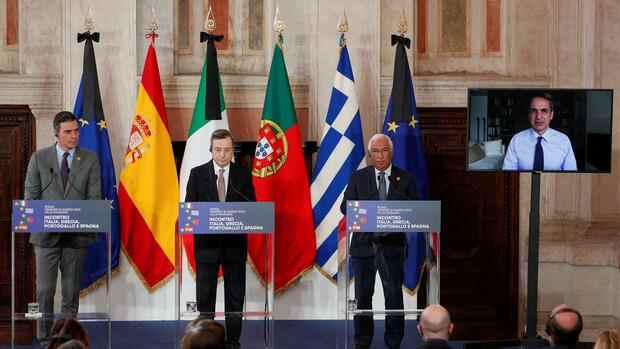With the expansion of renewable energies, the states in the south want to be “a win for the whole EU”.
(Photo: Reuters)
Rome Before Mario Draghi dedicates himself to the energy crisis, he would like to remember the corona dead: This Friday is Italy’s national day of remembrance for the victims of the pandemic. The fact that Corona is still present is also shown by a look at the screen next to the lecterns of Draghi, Spain’s Prime Minister Pedro Sánchez and Portugal’s Prime Minister Antonio Cósta: Your Greek colleague Kyriakos Mitsotakis is only connected via video. Corona. The quartet is actually already busy with the next crisis.
The signal that the four countries want to send from their meeting in Rome is clear: In view of the Ukraine war, Europe needs joint management of the energy market. “That would benefit everyone,” Draghi said. When buying and storing, for example, a united approach must be taken. “Joint inventories make it possible for us to protect each other in the event of individual shocks.” Joint purchases, in turn, would enable better negotiating weight with suppliers.
The four heads of countries are also calling for an upper limit for the import price of gas and also want to remove the link between gas and electricity prices in order to relieve companies and consumers.
“We have to intervene immediately,” explained Draghi. “We all feel that something substantial, important needs to be done immediately.” The EU has shown unity and determination in responding to the Russian invasion. It is precisely this unity that is now needed to overcome the energy crisis.
Top jobs of the day
Find the best jobs now and
be notified by email.
Portugal’s prime minister calls for concrete decisions
The southern countries are positioning themselves shortly before the next EU summit, which is to take place on Thursday and Friday next week. The next European Council must not be one where only guidelines are formulated or postponed, added Portugal’s Prime Minister Costa. It needs “concrete and immediately applicable resolutions”.
Greece’s Prime Minister Mitsotakis stressed that no country could deal with such a crisis alone. “If heating prices are multiplied by five or six, the answer cannot only be national.” European politics must be harmonized in order to be better armed against energy speculation. In the energy crisis, he not only sees the danger of threatening the recovery after the pandemic. It could also “cause a nightmare of populism” in the countries.
>> Read here: German companies are registering higher and higher energy costs and rising prices
The idea for the southern meeting came up at the recent summit of heads of state and government in Versailles, France. Draghi had already called for a cap on the gas price there. Germany fears that such a price cap could deter liquid gas imports from third countries. However, the EU is absolutely dependent on these imports if it does not want to continue to be dependent on Russian gas. France, which until now has mostly pulled together with the southern countries, has not yet positioned itself clearly on the subject.
Is the gap between north and south growing?
There is a risk that the gap between northern and southern countries on the issue of energy and supply security will widen again. Even before the Ukraine war there were always differences.
The dilemma is also clear to Draghi: “At the summit, we have to convince countries that have different needs and infrastructure than we do.” In the same breath, he emphasized how important southern Europe is for the green transformation of the entire continent. When it comes to expanding renewable energies, the states in the south are “a win for the whole EU”.
However, Draghi also made it clear that he was hoping for funds from the EU to meet the challenges: Europe is facing “very significant investments in the defense sector, energy policy and environmental protection”. These expenses are too high for any state budget, so European answers are needed “with the utmost urgency”.
Italy has long been pushing for expenses such as for the green transformation to be deducted from the EU’s debt rules. This is the only way for the country to come down from its high national debt, which currently accounts for 150 percent of economic output.
More: The economy fears the failure of Russian gas supplies. Politics and industry are already considering which companies will have to go offline first

